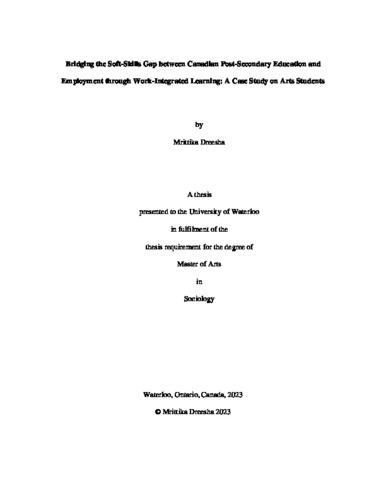| dc.description.abstract | Post-secondary institutions in Canada are currently under the microscope as the unemployment rate among new graduates continue to rise. Contemporary sociologists have suggested that work-integrated learning (WIL) can be a powerful tool to reverse the rising trends in unemployment rate by helping students develop soft-skills, gain relevant work experience, and apply classroom knowledge in real-world situations (Martin & Rouleau, 2020). Researchers have also highlighted that although WIL programs can be an effective pedagogical approach in all fields of study, there is a heightened importance for Arts students to participate in WIL (Li, 2016) as this specific group tends to encounter greater barriers in terms of finding employment (Yamamoto, 2014; Zeid et al., 2015). Despite the importance of WIL, there is a lack of Canadian qualitative research that documents the perspectives of Ontario Arts students regarding WIL programs. This is highly imperative as Arts degree-holders are often under-or-unemployed post-graduation (Zeid et al., 2015), particularly in Ontario which has one of the highest unemployment rates among graduates. To bridge this critical gap within the landscape of higher education literature on WIL, I have conducted a qualitative case study entailing 50 semi-structured interviews of Arts students from world’s largest co-op institution—the University of Waterloo, which serves as a strong exemplar of WIL as a successful education model on both national and global levels (University of Waterloo, 2023b). Using NVivo software data analysis techniques, I have answered four research questions which involved investigating the perceptions of WIL among Arts students, the key benefits and transferable soft-skills gained through WIL in Arts programs, the common challenges associated with WIL in Arts disciplines, and the WIL-related policies/practices that Arts students recommend to post-secondary institutions. Grounding this project on human capital theory, situated learning theory, and credentialism, the main findings reveal that when the value of WIL experience for Arts versus non-Arts programs are compared, students who are pursuing non-conventional Arts majors such as Accounting, Finance, and Economics consider the importance of WIL to be same or similar for all fields, whereas students from traditional Arts programs such as Sociology, Psychology, and History predict that WIL experience can be a higher economic investment and a larger evidence of competencies for Arts degree-holders as they are more likely to experience greater difficulties in the job market due to Arts professions being stigmatized. Furthermore, the non co-op students voiced their concerns regarding insufficient exposure and awareness of WIL in post-secondary institutions which resulted in their lack of participation, whereas the co-op students expressed that there are limited field-specific WIL placements and low departmental/faculty support which made their process of seeking and securing co-op positions challenging. Both groups of students perceive that there is a shortage of WIL opportunities within the Faculty of Arts, and thus, they emphasized on the increasing need to make WIL accessible for all Arts students which can contribute towards their human capital growth, graduate employability, and ultimately improve their school-to-work transition while bridging the soft-skills gap between post-secondary education and employment. | en |

